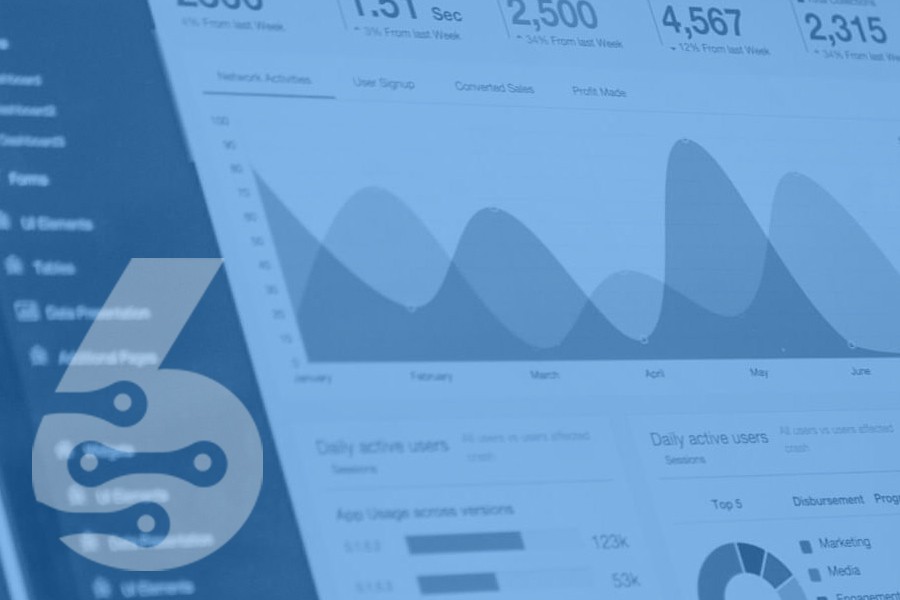- CRM
- 18.07.2023
CRM Systems for SMEs
Everything you need to know about Customer Relationship Management Systems
Ben Talin
18.07.2023
As a business owner, you know the importance of managing customer relationships. An effective Customer Relationship Management (CRM) system is essential for any small to medium-sized enterprise (SME). CRMs enable businesses to store and manage customer data, track sales leads, and automate marketing campaigns from one central location.
With a CRM system, SMEs can eliminate manual processes associated with managing customers, such as relying on salespeople’s notes or spreadsheets, instead of trying to remember who said what when you could use your CRM to create powerful insights into how your customers interact with your brand.
This article will discuss the advantages of using a CRM for SMEs and why they need one.
Understanding CRM systems
Types of CRM systems
For the average businessperson, a CRM will always be a place to manage customers. But in general, we could differentiate three parts and types of CRM systems: Operational, Analytical, and Collaborative.
Operational CRMs are designed to help businesses manage customer interactions and activities. It consolidates customer data into one database, allowing SMEs to quickly access customer information and track all of their actions in one place. Operational CRM enables companies to record sales opportunities and pipeline management with proactive follow-up and provides automated marketing capabilities. This CRM helps automate the sales process and streamline customer service operations.
Analytical CRMs are used to generate insights and analyze data collected from customers. This type of CRM allows SMEs to uncover trends, identify areas for improvement, and anticipate customer needs by exploring customer identity characteristics, behaviors, and preferences. Analytical CRMs also enable SMEs to track various metrics, including conversion rates, lifetime value (LTV), average order value (AOV), etc., allowing them to make informed decisions about their product offerings or marketing campaigns.
Collaborative CRMs are designed for businesses collaborating with customers to develop new products or services, such as crowdsourcing platforms like IdeaScale or Kickstarter. Collaborative CRMs let SMEs interact with customers directly through the platform, enabling them to solicit feedback on existing projects or solicit ideas for new ones. It also allows companies to track project progress to stay on top of their goals and objectives.
Key features of a CRM system
The biggest goal of a CRM system is leveraging features that will help eliminate manual processes associated with managing customers and gain powerful insights into how customers interact with the brand.
Here we will mention 6 of the most useful features you might want to have integrated with your CRM system:
- Contact management
- Lead management
- Sales management
- Marketing automation
- Customer service and support
- Reporting and analytics
Contact management
Contact management is an essential component of a CRM system. It allows businesses to store and manage customer contact information, such as email addresses, phone numbers, and physical addresses. With this feature, SMEs can easily centralize their customer data in one place. This allows them to quickly access customer records when needed and keep track of all customer interactions. Additionally, contact management can automate the process of segmenting customers into different categories based on criteria such as age, gender, or location.
For example, a small retail business could use a contact management feature to organize customers by geographic location so they can target localized promotions or discounts specific to each area.
Lead Management
Lead management is another crucial feature of a CRM system that enables businesses to track potential sales leads and opportunities in real time. It provides visibility into each lead's stage in the sales funnel and helps companies stay organized in managing prospects. For example, lead management allows SMEs to move leads from one stage to another quickly and accurately based on customer actions or responses.
With lead management capabilities, companies can also keep track of leads that have gone cold and take measures to re-engage them if necessary. Finally, lead scoring can help SMEs prioritize prospects for follow-up activities based on their profile data and activity history.
Sales Management
Sales management systems help small businesses streamline their sales processes by automating repetitive tasks associated with selling products or services. It provides visibility into deals throughout the entire sales process—from initial outreach to closing the sale—and provides actionable insights into which strategies are most effective for driving results.
For example, if an SME wants to determine which sales tactics are most successful for closing deals with certain customers, it can use its CRM’s reporting capabilities to uncover this information quickly and easily without wasting time manually tracking every deal’s progress through spreadsheets or notes from salespeople.
Marketing Automation
Marketing automation is a powerful tool available within many CRMs that allow business owners to automate marketing campaigns across multiple channels like email, SMS text messages, or social media platforms like Facebook or Twitter. This capability enables SMEs to create targeted campaigns based on behavioral data collected from customers to deliver more personalized experiences for each individual user.
For example, a clothing retailer could set up automated emails triggered by specific actions taken by customers, such as making purchases online or viewing certain product pages on its website—allowing the company to stay top-of-mind with its audience while potentially increasing conversion rates at the same time.
Customer Service & Support
Customer service & support are other essential components of any successful CRM system for small businesses. It allows them to handle customer inquiries efficiently while providing better overall service experiences for those interacting with their brand.
By leveraging features like ticketing systems (for tracking customer queries) or live chatbots (for responding quickly), SMEs can provide faster resolutions while having visibility into how long it takes agents or departments to resolve issues reported by customers over time—helping them identify areas where they may need additional resources or training in order improve operations in the future as well as enhancing customer relationships overall.
Reporting & Analytics
The reporting & analytics capabilities enable businesses using CRM to gain powerful insights into how their customers interact with their brand over time—helping them optimize marketing efforts while driving better results from current and future campaigns they plan on launching. This feature gives business owners access to various metrics such as conversion rates and Return On Investment (ROI) so they can better understand how effective their marketing decisions have been up until this point and make informed decisions about where resources should be allocated in the future accordingly.
Benefits of using a CRM system for SME companies
There are many benefits of using a good Customer Relationship Management System for every company size. But especially SME companies should understand some of the most crucial benefits of CRMs:
Improved Customer Relationships
Using a CRM system for small businesses can help them to establish better relationships with their customers by understanding their needs and providing the right solutions or services. By leveraging customer data such as purchase history, demographics, and preferences, companies can tailor their interactions to provide more personal experiences that will resonate with the user—ultimately leading to stronger customer loyalty.
Increased Sales and Revenue
A CRM’s features like sales automation, marketing automation, and reporting & analytics can help SMEs increase their sales revenue by optimizing marketing efforts, converting leads into customers more efficiently, and tracking performance metrics for future decision-making. This capability can help businesses grow their customer base and boost long-term revenue by providing more personalized experiences for their users.
Better Customer Data Management
CRM systems can also help small businesses manage customer data more effectively by organizing it into a centralized database that is easy to access, analyze, and update as needed. This feature not only simplifies the management process but also helps prevent potential data loss due to human error or mismanagement.
Improved Marketing Efforts
With a CRM, small businesses can use powerful marketing automation tools that can help them target their messaging more precisely and engage with customers in real time. This feature enables companies to create personalized customer experiences that keep them returning for more.
Increased Productivity
By automating specific tasks, a CRM system can help small businesses save time and resources by reducing the number of manual processes they have to handle. This feature enables companies to focus on essential tasks that require attention and streamline their operations to get more done in less time.
Better Decision-Making Through Data-Driven Insights
Data-driven insights can provide invaluable information businesses need to make informed decisions about their operations and marketing strategies. A CRM’s reporting & analytics capabilities can help SMEs gain powerful insights into customer behavior and preferences, enabling them to track performance metrics and optimize their marketing efforts accordingly.
Less Hassle, More Growth – The SIX ERP Way.
Choosing the right CRM system for SME companies
The right CRM system is critical to helping them maximize their resources and achieve better results. With the right tool, small businesses can unlock powerful insights that will help them
drive more sales and revenue while providing superior customer experiences.
Determining business needs and goals
Before deciding on a CRM, SMEs should first determine their needs and goals. They should consider budget, customer data management requirements, operational processes, and marketing objectives to ensure they select a solution that fits their unique requirements. It’s also important to factor in scalability—as the company grows, it should ensure that the CRM system they select can grow with them.
Evaluating different CRM systems and their features
Once businesses know what they need, they can evaluate different CRM systems and their features. It’s essential to look into solutions that provide the right tools and capabilities, such as sales automation, marketing automation, reporting & analytics, customer data management, etc.
SMEs should also consider trying out a free trial or demo of the solution. This will allow them to understand better how the system works and if it meets their needs before investing in it.
Considerations for SME companies
While most SMEs will primarily use the basic features of a CRM system, it’s essential to look for the proper context. Because feature-rich systems and systems designed for large corporations might look nice and offer thousands of features, but SMEs are paying them a hefty price and creating extra complexity for something they don't need.
We would recommend to look at the following things in a CRM:
- Affordability and Total Cost of Ownership - A CRM system's affordability and total cost of ownership (TCO) is an essential consideration for SMEs, as it can help them make the most out of their limited budgets. When evaluating solutions, businesses should consider the upfront costs, such as subscription fees and implementation costs, as well as the long-term costs associated with maintenance and upgrades.
- Ease of use and fast implementation - The CRM system should be easy to use and implemented to ensure that employees can utilize it without difficulty. SMEs should select a solution that provides a user-friendly interface, intuitive navigation, contextual help, and other functionalities that make using the system easy. Take care that you don't focus too much on features but on easy workflows for creating customers, updating records, clean interfaces, etc.
- Integration with other systems and tools - Also consider whether or not their CRM system can integrate with other systems and tools used by the company. This will enable businesses to take advantage of all the features available without purchasing several different solutions. The best would also be to have a CRM that is already integrated into an ERP solution, so there are no unnecessary connections or difficulties when you want to use the data in the future somewhere else.
- Scalability - Scalability is an essential factor when selecting a CRM system, especially when the company plans to grow and expand. The solution should increase as the company grows, so businesses can take advantage of new features and capabilities as their needs evolve.
The advantage of having an ERP with CRM included for SME companies.
What is an ERP system?
An Enterprise Resource Planning (ERP) system is a comprehensive suite of integrated software applications designed to manage core business processes such as manufacturing, logistics, inventory management, finance and accounting, customer relationship management (CRM), and human resources. The purpose of an ERP system is to streamline the operations of a business by automating various processes, improving the accuracy and efficiency of data processing, and reducing operational costs.
Having an ERP with CRM included offers SMEs a variety of advantages. The primary benefit is that they can manage their entire business under one system, eliminating the need to purchase multiple solutions for various functions.
The benefits of having an ERP system with CRM included
- Single System: With an ERP system that includes CRM capabilities, SMEs can manage all of their business processes in one platform instead of maintaining multiple systems for different functions such as accounting, manufacturing, inventory management, customer relationship management, and human resources. This eliminates the need to purchase separate solutions and reduces operational costs significantly.
- Improved Data Management: An integrated ERP with CRM makes it easier for SMEs to access real-time data from any module within the system quickly and accurately, which helps them make better decisions faster. It also ensures data consistency by eliminating redundant entries across different applications.
- Improved Efficiency & Productivity: By automating various tasks in the organization, such as creating reports or tracking inventory levels, an integrated ERP with CRM enhances efficiency and productivity significantly by reducing manual workloads and enabling employees to focus on more strategic activities instead of mundane administrative tasks.
- Increased Cost Savings: As mentioned earlier, having a comprehensive ERP system with built-in CRM capabilities enables businesses to save money since they no longer have to invest in multiple software solutions separately or pay additional fees for maintenance and upgrades - everything is included under one roof! Furthermore, businesses can gain insights into their operations.
Conclusion
In conclusion, CRM systems are a great way to start digitalizing your business operations. For SMEs especially, it is essential to find an affordable and easy-to-use system that meets their needs. An ERP with CRM included may be the best option for those who want all their core business processes managed under one roof. With this type of solution, businesses can benefit from improved data accuracy and consistency and increased cost savings and efficiency, and productivity gains. If you’re an SME looking for a comprehensive yet budget-friendly software solution, consider investing in an integrated ERP with built-in CRM capabilities today!
SIX ERP with CRM
SIX ERP is the perfect solution for SMEs looking for a comprehensive, affordable, and easy-to-use software system. It is equipped with all the features and capabilities that an SME could need to manage its core business processes, such as manufacturing, logistics, inventory management, finance and accounting, customer relationship management (CRM), and human resources.
With SIX ERP, SMEs can benefit from a single system to manage their business processes instead of maintaining multiple systems for distinct functions such as accounting, manufacturing, inventory management, customer relationship management, and human resources. This eliminates the need to purchase separate solutions and reduces operational costs significantly.
About the author
"Ben" is an international, renowned expert in the field of digitalization, change management, and innovation. He founded his first company at 13, and many more have followed. His passion is changing the status quo with technology and innovation. His experience ranges from marketing, change management, and digital product and strategy development to platforms and complex ecosystems. Since 2017, Benjamin Talin is also founder and CEO of MoreThanDigital, which has become one of the world's leading platforms for digitalization, innovation, and future topics.
Related articles

Managed Cloud ERP
As your business grows, it becomes increasingly important to have a reliable and efficient system to manage your operations. A cloud-based ERP system is the perfect solution for businesses of...
11 benefits of using ERP systems for SME companies
ERP software can be a great help to businesses of all sizes. ERP can support your company in many ways, from improving inventory management and order fulfillment processes to providing...



